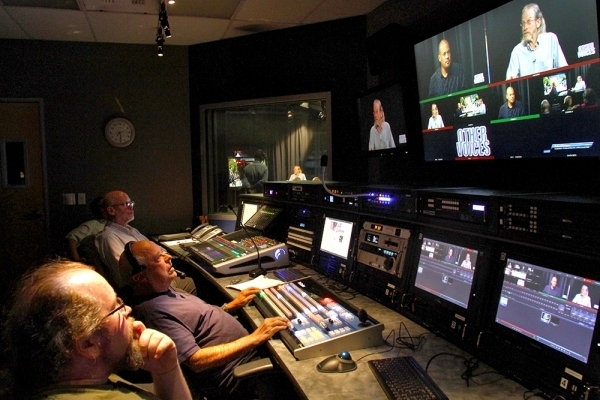A Palo Alto-led consortium of cities is preparing to buy the Media Center's headquarters on San Antonio Road in a deal that would effectively allow the local nonprofit to use the fees from cable bills to support its day-to-day operations.
While some of the most critical details of the plan, including the purchase price, have yet to be hashed out, Palo Alto and the nonprofit have already reached a tentative agreement on several key terms, which the City Council endorsed Monday night. The Cable Joint Powers Authority, which also includes Palo Alto, East Palo Alto, Menlo Park, Atherton and portions of San Mateo and Santa Clara counties, would fund the purchase through "public, education and government" (PEG") fees, which amount to 88 cents on every cable bill.
The cities' move to buy the building comes three years after an audit from City Auditor Harriet Richardson criticized the Media Center for using PEG fees to pay for operating expenses, in violation of a federal law that only allows the use of these fees for capital costs. Since then, staff and Media Center officials have been considering the best way to invest these fees in a way that would allow the nonprofit to continue to operate.
The 2016 review prompted a testy debate between city officials and its Media Center partners. While the city has publicly acknowledged the value that the Media Center's course offerings and programs bring to the region, officials have been scrambling to find ways to support the nonprofit without falling afoul of the federal law. The Media Center, for its part, had protested the auditor's findings and Richardson's interpretation of the federal restrictions on PEG fees. Restricting how these fees are used would turn its annual funding into "political football," the nonprofit's former Executive Director Annie Folger had argued at the time.
Since then, the two sides have been considering possible ways to support the nonprofit without violating the law. David Ramberg, assistant director of the city's Administrative Services Department, told the council that staff had determined that the best way to achieve this goal is to use the fees to buy the nonprofit's video production and training facility. The Media Center, which offers broadcasting classes, produces educational and community-based shows and broadcasts government meetings, would then use the fees to support its operating budget.
"Staff believes it's the most viable option for long-term financial sustainability of the media center," Ramberg said.
Ramberg said the cities currently get about $325,000 in annual PEG fees (these are separate from the roughly $1.8 million in "franchise fees" that the JPA cities get annually from Comcast and AT&T). The cities would then use about 70 percent of these fees every year on the building purchase. If the building is valued at about $5 million, the purchase would take about 20 years to complete, Ramberg said.
Both sides stand to gain from the sale. Palo Alto and its partners would own a new physical asset, funded by cable viewers. The Media Center, by giving up a building it had owned since 2003, would acquire a new funding stream and long-term stability. A key provision of the purchase agreement is the dedication of the building toward PEG purposes for the life of the asset.
The city would also give the Media Center "exclusive possession of the building," which would occupy on a rent-free basis. While most of the building would have to be dedicated for PEG purposes, the Media Center would be allowed to use otherwise idle space for fee-bearing professional services, such as corporate events.
Ramberg noted that the sale comes with a few risks. With more customers "cutting the cord" and switching from cable to streaming services like Netflix and YouTube, PEG fees could drop. So far, the revenues have held fairly stable, ranging from about $313,000 to $347,000 over the past decade. If that changes, however, the cities may not have the resources they need to complete the purchase as planned.
Federal law is another wildcard. Ramberg noted that it's possible that federal law could change to allow the use of PEG fees for operating costs. If that happens, the building's sale would no longer make as much sense for the Media Center.
Ramberg said the agreement will include clauses that will allow the Cable JPA and the Media Center to renegotiate its terms in either of these circumstances.
"Both of these risks would be addressed," Ramberg said.
The council strongly supported staff's effort to reach a deal with the Media Center and directed by a unanimous vote to move ahead with the negotiations. Councilman Greg Tanaka said he was concerned about the risks Ramberg had cited and wondered whether it would make more sense to house the Media Center's broadcasting operations at Paly or Gunn. But he also joined the rest of the council colleagues, as well as about 15 supporters of the nonprofit, in signaling support the new deal.
East Palo Alto City Councilman Larry Moody told the council that his city is often seen as an "information desert." The Media Center, he said, not only helps fill the information gap but it also creates a place for local youths to go visit to pick up new skills and "build out their voice."
"We don't have a local newspaper, we don't have access to platforms that give us opportunities to really tell our story and tell our narrative," Moody said. "The Media Center over the years has provided that access to the community."



Comments
Evergreen Park
on Jan 30, 2019 at 12:02 pm
on Jan 30, 2019 at 12:02 pm
This sounds like a win-win for all parties-- Kudos to the City and MC staff who have thought of possible contingencies and dealt with them in the agreement. The MC is such an amazing resource-- may it long continue. I'm happy to see that others recognize its value too, and want to see it thrive.